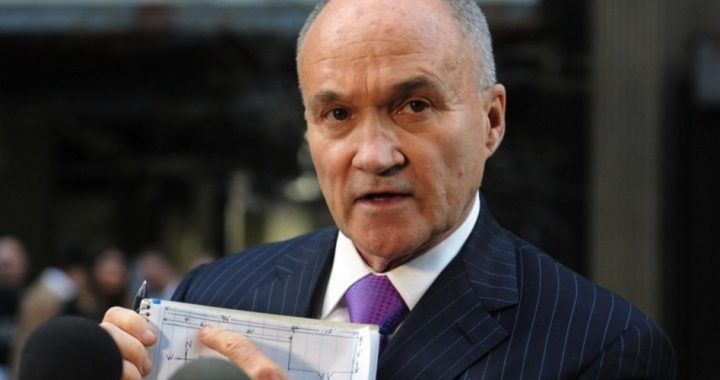
Within hours of Janet Napolitano’s announcement of her resignation as secretary of the Department of Homeland Security, names of people to replace her surfaced, but none have the credentials of NYPD Commissioner Raymond Kelly (shown). Or his political connections. Said Senator Charles Schumer (D-N.Y.):
The Department of Homeland Security is one of the most important agencies in the federal government. Its leader needs to be someone who knows law enforcement, understands anti-terrorism efforts, and is a top-notch administrator, and at the NYPD, Ray Kelly has proven that he excels in all three.…
There is no doubt Ray Kelly would be a great DHS Secretary, and I have urged the White House to very seriously consider his candidacy. While it would be New York’s loss, Commissioner Kelly’s appointment as the head of DHS would be a great boon for the entire country. Janet Napolitano has done an outstanding job, and if I had to give her a grade on her tenure, it would be “A+”. We need someone just as good who can fill her shoes.
If Kelly is nominated and passes scrutiny in the Senate, not only would he fill Napolitano’s shoes, he would greatly expand their size and reach. When Schumer touted Kelly to replace FBI Director Robert Mueller back in 2010, he said that “Kelly is the preeminent law enforcement person in the country. He knows more about this than anyone … his anti-terrorism experience is second to none.”
Kelly’s first challenge as NYPD commissioner under Mayor David Dinkins in 1990 was to overcome suspicion that he had unfairly been promoted ahead of people with more experience. After less than seven months on a street beat, Kelly was promoted to first deputy over several three-star bureau chiefs and a four-star chief of department, Robert Johnston. In fact, the previous police commissioner, Lee Brown had to do some hierarchical readjusting in order to prevent Johnston from having to report to his former subordinate.
Initially Kelly was known as a friendly face to New Yorkers under Dinkins, mastering the art of public relations and instituting the Safe Streets Safe City program, which put thousands more police on the streets trained to interact with local communities. When Dinkins failed in his reelection bid, Kelly was out of a job; but in 1994, the new mayor Michael Bloomberg appointed Kelly once again as commissioner, and that’s when the friendly face disappeared. As New York State Senator Eric Adams noted:
Kelly was one of the great humanitarians in policing under David Dinkins. I don’t know what happened to him that all of a sudden his philosophical understanding of the importance of community and police liking each other has changed. Sometimes the expeditious need of bringing down crime numbers bring out the worst in us. So instead of saying let’s just go seek out the bad guy, we get to the point of, “Let’s go get them all.”
In order to know where they “all” are, Kelly revamped the department into a mini-surveillance state. Prior to the September 11, 2001 attacks, there were fewer than two dozen (out of 35,000) officers working on the threat of terrorism on a full time basis. Today there are more than 1,000 and not all of them are located in New York City. Under his Intelligence Division and Counter-Terrorism Bureau (headed up by a former CIA operative) he now has officers stationed in 11 foreign cities to keep an eye on things and report back to Kelly if they note anything that might in any way remotely impact the safety and security of New Yorkers. Those officers’ beats include London, Paris, Madrid, Tel Aviv, Hamburg, and Toronto. He has also created an extensive network of undercover agents prowling the streets, alleys, and mosques of New York (who are called “mosque crawlers”), building extensive databases of suspicious characters inhabiting stores, restaurants, and clubs in dangerous neighborhoods.
Taking advantage of the developing surveillance technology, Kelly installed CompStat, a database management program coupled with a crime mapping system called ArcGIS and Microsoft MapPoint to monitor the activities of suspects. In addition, he installed a Domain Awareness System, a joint project of the NYPD and Microsoft, which links the thousands of surveillance cameras watching New Yorkers with license plate readers and other surveillance devices. All of these allow Kelly to monitor the entire city from his office as well as from his “travelling bunker,” a blacked-out Chevrolet Suburban which contains the latest in the art of surveillance along with a number of police radios that are cued in to the city’s 76 police precincts and command posts. This data is shared with the NYPD’s counterterrorism unit, which is housed in a secret location called The Barn. So advanced is the technology that Kelly has acquired in his quest to “enforce the laws, preserve the peace, reduce fear, and provide for a safe environment” (the department’s mission statement) that he has anti-aircraft missiles available to repel airborne attacks.
He also has an attitude that the ends justify the means. During the 2004 Republican National Convention in New York City, 1,806 protesters were arrested and housed in Pier 57, a bus depot that became known as Guantanamo on the Hudson. Arrestees said they had to sleep on cold floors that were slick with bus oil. Most of those arrests were tossed, but the resulting lawsuits cost the city $8 million in settlements and lawyers’ fees. Said Kelly:
That’s the cost of doing business here for us. Don’t forget you had groups saying they were going to close the city down. [That] simply didn’t happen. The aftermath is inevitable in this city when litigation is just the name of the game.
Then there’s his “stop and frisk” program, which profiles blacks and Hispanics but rarely generates an arrest that sticks. Said Vincent Warren, executive director of the Center for Constitutional Rights (CCR): “What we have is cops harassing people in black and brown neighborhoods, hoping they might find something.” In response to lawsuits filed by the CCR, Kelly said again that it’s well worth it: “The tactic is a lifesaver. Critics complain that the stops don’t represent the demographics of the city. Well, no kidding!”
He investigates his own people too, to make sure they keep in line. When a police officer leaked information about the murder of Imette St. Guillen in 2006, he turned the investigation inward, demanding that 33 officers turn in their cell phones so that his private investigative army could determine who the guilty party was. Once again, Kelly said the end justifies the means:
They broke the code. This [was] in the front pages of the papers, they’re putting this out before the individual was taken into custody. Reporters want leaks and they don’t care where [they] come from. But when it undermines the apprehension of a murderer, that can’t be tolerated.
The only trouble is that Kelly’s internal investigations have turned up valid misconduct violations in only 20 percent of the 169 cases charged over the past couple of years. Said Roy Richter, the president of the police captains union, “It’s negative for morale and destroys confidence. It makes cops pay more attention to details and less attention to the objective. To manage a precinct, which is a multimillion-dollar operation, there has to be some trust.”
To Donna Lieberman, head of the New York Civil Liberties Union (NYCLU), Kelly’s policies are “hyperagressive” and his police force “has taken on the aura of an occupying force.”
If Ray Kelly, good friend of Senator Chuck Schumer and close friend of Mayor Michael Bloomberg, gets the nod from President Obama, then Kelly likely can be counted on to extend and expand his police state technology and his “occupying force” nation-wide.
Photo of NYPD Commissioner Ray Kelly: AP Images
A graduate of Cornell University and a former investment advisor, Bob is a regular contributor to The New American magazine and blogs frequently at www.LightFromTheRight.com, primarily on economics and politics. He can be reached at [email protected]



